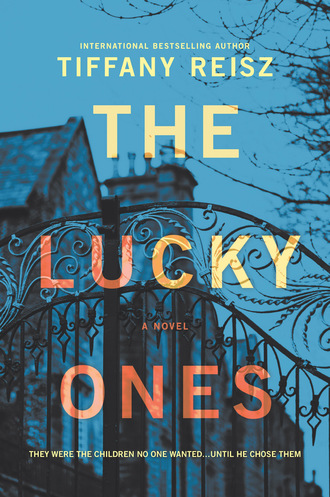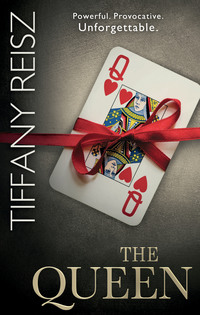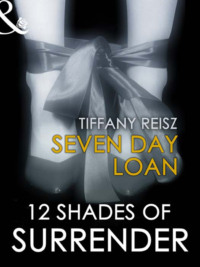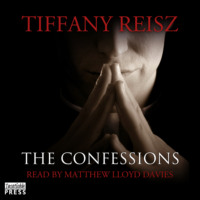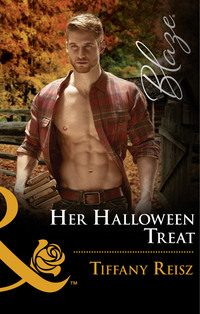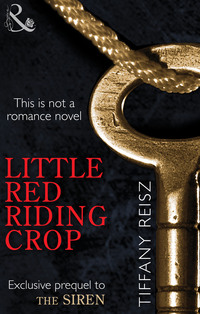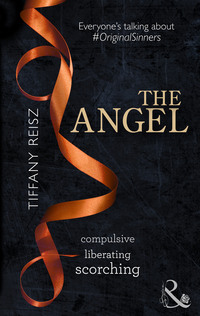“Oregon?”
She glanced in the box at the padded envelope. Sure enough, it was postmarked Clark Beach, Oregon. And the name on the return address read Roland Capello.
Allison gasped, then clapped a hand over her mouth in shock.
“Allison?” McQueen had been retreating during the conversation but now he rushed to her. “Honey, what’s wrong? You look like you’re about to faint.”
“It’s from my brother,” she breathed. “This is from my brother.”
McQueen stared at her like she’d grown a second head in the past three seconds.
“Your brother?” he repeated. “I’ve known you seven years. You never told me you had a brother.”
Allison looked at him with tears in her eyes.
“That’s because...I don’t.”
Chapter 2
McQueen sat her in a chair and poured her a tumbler of bourbon, which Allison nearly dropped. She’d almost fainted. Truly fainted. She wasn’t a fainter. She’d never been a fainter. But seeing that name on that envelope had nearly sent her falling to the floor. If McQueen hadn’t been there she might have passed out cold.
“Drink,” he ordered, and she took a sip. It hit the back of her throat and set fire to her brain.
“Whew. That’s strong.” Too strong, but it stopped her hands from shaking.
“That’s panic-attack bourbon,” he said. “Hundred-ten proof. Feel better?”
“I feel like I’m going to faint but now it’s for a totally different reason.”
“We’ll take that as an improvement.” Gently he removed the glass tumbler from her hand and set it on the side table. “Now, tell me what’s going on?”
“Why?” She met his eyes with confusion.
“Why? Because I say, ‘Hey, you have a package from Oregon,’ and then you nearly faint on me?”
“I’m not your responsibility anymore, remember? We had that talk.”
“Soon as I walk out that door,” he said, pointing at the white door with the white knob, “it’s over. Not until then.”
“It’s no big deal. Don’t worry about it.”
“Who’s Roland Capello? Don’t say he’s your brother. I know he isn’t.”
Allison didn’t want to tell him the whole sordid story, but she didn’t want to fight with him about it, either. McQueen had a strong personality and an even stronger will. Better to tell him and get it over with.
“He was my brother,” she said. “Once. A long time ago.”
“How was someone once your brother? Stepbrother?”
“Adopted,” she said. “Me, I mean. Sort of. It’s complicated.”
“Here. Drink more. You’ll feel less complicated in no time.”
He pressed the glass into her hand and she took another sip. Rough stuff but the buzzing in her head distracted her from the wild beating of her heart.
“You told me your mom died when you were seven, right?” McQueen said. “Car accident?”
“Drunk driving,” Allison said. “She was the driver. I didn’t know that until I was a lot older. I guess people didn’t want me blaming her for dying. I didn’t have any relatives around. Mom had moved us from Indiana to Oregon for a boyfriend but they split up. When she was gone, they stuck me in foster care. I was in one of those group homes with a bunch of girls. They were older and mean, and I was tiny and scared all the time. Then one day this man showed up in a big black car and took me home with him. Dr. Capello. He’s a very famous philanthropist and neurosurgeon.”
“Never heard of him.”
“Well, he’s famous in Oregon the way you’re famous in Kentucky.”
“So, pretty damn famous, then,” McQueen said. Allison ignored that.
“Dr. Capello inherited a fortune from his parents and I think he had his own money, too.”
“I never met a broke neurosurgeon.”
“He was known for helping needy kids. I think in the beginning he did pro bono surgeries and that sort of thing. But at some point he became a foster parent. He took in a bunch of kids.”
“An Angelina?”
Allison smiled. “Yeah, an old, male Angelina.”
“How old?”
“Very old. Fifty, I think.”
McQueen, age forty-five, gave her a dirty look.
“I was one of the kids he took in,” she said. “Lucky me.”
“And Roland?”
“Him, too. Except Dr. Capello adopted him,” Allison said. “I haven’t heard from him since I left The Dragon. That’s why I was so surprised.”
“The what?”
Allison smiled behind her glass of bourbon. “The Dragon—that’s what the house was called. You know how beach houses have funny names? Sandy Soles and Blue Heaven or whatever? Dr. Capello said we lived at the edge of the world and on old maps that’s where ‘there be dragons.’ And the house was big and green with shingles like scales. It kind of looked like a dragon when you saw it from a certain angle.”
McQueen nodded his understanding. “So you lived there with a bunch of other foster kids. Was it as bad as I’m imagining?”
“It was paradise,” she said. “Xanadu.”
“Xanadu?” McQueen repeated. “Like the movie?”
“Like the poem,” she said. “‘In Xanadu did Kubla Khan / A stately pleasure-dome decree...’ I used to have it all memorized. Anyway, it was lovely there.”
She couldn’t sit still anymore so she put her glass on the table and stood up. She went to the bookshelves that lined the walls and started searching for a book, not because she wanted to read it, but to find something she’d slipped inside it long ago.
“You know that’s crazy, right?” he said.
“What? Didn’t everyone live in a magical beach house with a famous doctor as a kid?”
“Cricket.” McQueen hated sarcasm as much as he hated when she wore jeans.
“I know it sounds nuts,” she said. “I do, but it seemed normal at the time. I was seven, though. I still thought Santa Claus was real. Of all the kids, Roland was the one I was closest to. He was older. He was nice. I just... I never thought I’d hear from him again. That’s all.”
McQueen leaned back in his armchair and steepled his fingers. He did this when he was thinking. She had a feeling he was thinking, That’s not all.
“What aren’t you telling me?” he asked.
“That I want you out of my apartment right now,” she said casually, without malice and without much truth, either. She ignored him as best as she could as she studied her shelves.
“About your brother. Usually when nice people send me mail, I don’t almost lose my lunch.”
“I’m done talking about this with you.”
“I’m not done listening.”
“Well, there’s nothing more to tell.”
“We’ve been sleeping together for six years, Allison. I know when you’re faking it with me. You’re faking right now. You went white as a sheet when you saw his name on that envelope. That’s not like you. You are not a drama queen. You don’t overreact. When we were mugged in Milan, I was the one who puked afterward, not you. There is something you’re not telling me, and I’m not leaving until I know what it is.”
“You’re being nosy.”
“I care,” he said.
“You have an interesting way of showing it,” she said. She’d found her book at last, but didn’t open it.
McQueen sighed. He beckoned to her and she walked to him, sitting in front of him on top of the coffee table between his knees. He leaned forward and took the book from her hand and put it aside. He raised her hand to his lips, kissed her knuckles, before turning her hand over. He caressed her palm with his fingertips, a sensual touch but also comforting.
“Did something bad happen to you in that house?” he asked, meeting her eyes. If she’d thought for one single second that McQueen was prying out of curiosity or nosiness or because he felt entitled to her secrets, she would never have answered. But the man who’d asked that question wasn’t McQueen the rich jerk who was dumping her, but McQueen the scared father who’d burn the world down if anyone hurt his children.
“Dr. Capello didn’t molest me if that’s what you’re asking.”
McQueen took a heavy breath, relieved on her behalf.
“That’s what I’m asking,” he said. “So nobody hurt you, then?”
“I didn’t say that.”
“Tell me what happened.”
“It’s not—”
“Tell me what happened and I’ll leave.”
“You promise?”
He carved an invisible X on his heart with his finger. “Once I know you’re okay, I’ll go.”
Allison hadn’t thought about her old life with Dr. Capello and his kids in a long time. She tried not to think about them, she certainly never talked about them and she never ever invited memories into her mind. They came sometimes, however, uninvited, creeping like ants through a crack in the wall.
“You wouldn’t be this freaked out if it was really that good there,” McQueen said.
“I’m not freaked out,” she said, maybe a lie, maybe not. She was just...surprised, that’s all. “You’d be shaky, too, if your brother contacted you out of the blue after thirteen years.”
“True. Because I don’t have a brother, even an almost-brother. You do.”
Allison released his hand and picked up the book she’d found, an old copy of Shaw’s Pygmalion, the pages highlighter-yellow from her days as an English major in college.
“Allison?”
She gave in.
“The last summer I was there, someone in the house maybe possibly pushed me down the stairs.”
“What?” McQueen said, eyes wide with fury.
Allison shrugged, said nothing.
“An accident?” McQueen asked.
“So I was told.”
“But you don’t think it was an accident?”
Allison held the book to her chest.
“My great-aunt was seventy when my mom died. She was living in southern Indiana. That’s why I went to live with Dr. Capello instead of her. But I still called her once a week to check in. The day of my fall—or whatever it was—someone apparently called her, pretended to be me and told her that there was a killer in the house and I needed her to come get me.”
McQueen started to speak.
“Before you ask,” Allison said, “I don’t know who it was who called or who pushed me—if someone did push me. When I fell, I hit my head so hard I don’t even remember falling. I don’t remember waking up in the hospital. I don’t remember much of anything from around that time. What I do remember is that I was living at The Dragon, happiest kid on earth, and then I was in Indiana later that summer, living with my aunt in her tiny apartment.”
“That must have been a hard hit,” McQueen said. “What did the police say?”
“There wasn’t even an investigation,” she said. “There was no evidence other than the phone call, and everyone chalked that up to my aunt being old and hard of hearing, maybe even confused. Everyone but me. That woman could hear a pin drop and she had all her faculties intact to the day she died.”
“No witnesses?” McQueen asked. Allison ignored the urge to roll her eyes. He was talking like a cop.
“Nobody came forward that I know of.”
“Kids can be really violent,” McQueen said.
“Not these kids,” Allison said.
“Then who did it? Someone did something or you never would have had to leave.”
“I’m telling you what my aunt told me when I started asking her why I was with her and not with the Capellos anymore. Apparently Dr. Capello was the one who found me at the foot of the steps bleeding from the ear. He said he was too panicked to do anything but scream for someone to call 911. If it had been an accident I’d like to think whoever it was would have admitted to it. But nobody ’fessed up. Not even when my aunt flew out to pick me up and take me home with her. When I went to live with her, she wouldn’t let me contact the Capellos. She thought... She didn’t know what to think. And the Capellos never contacted me, either, after that. Probably because my aunt told them not to. Thirteen years of radio silence. Until today.” She glanced over at the table where the package from Roland still sat, unopened.
“So you never called? Never visited?” McQueen asked.
“I wanted to when I was a kid and then a few years passed and the whole thing kind of felt like a good dream with a nightmare ending. When I was old enough to go back on my own, I just...didn’t. If they’d sent me even one birthday card, I might have. But they didn’t.”
“I can’t believe you never told me any of this,” he said, shaking his head.
“You never asked. You never wanted to know, did you? Then you’d have to think of me as a real person,” she said. McQueen had the decency to look ashamed of himself.
“You still could have told me.”
“You still could have asked,” she said. “Anyway, doesn’t matter. Ancient history. I’m over it all.”
“Except you aren’t,” he said. “Except you see the name Roland Capello on that envelope and you turn white as a ghost. You take a book off the shelf and hold it so tight for some reason your hands shake.” He took the book from her hands. “Except you...” He flipped through the book and found a page marked by a photograph, which he pulled out. “Except you keep a picture of your old family pressed in the pages of that book.”
Allison swallowed. “Except all that,” she said.
McQueen was staring at the photograph he’d taken out of her book. Allison didn’t look at it. She didn’t have to. She saw it in her mind’s eye. There were three kids in the picture—all three in red hoodies. One boy with dark blond hair that fell past his ears, one girl with hair so red it was almost orange and one boy with black hair straight as an arrow. They all held sparklers in their hands and in the background of the photo was the ocean, vast and gray.
“Roland?” McQueen asked, pointing to the one with black hair.
“That’s Deacon. Roland’s the dirty blond,” Allison said. “The girl’s Thora. Dr. Capello gave us those red sweatshirts. He said it made it easier for him to find us on the beach when there were big crowds.”
“Sweatshirts on the beach?”
“It was Oregon,” she said.
“And where are you in this picture?” McQueen asked.
Allison pointed to the left side of the photograph that had been torn away.
“There,” she said. “I don’t know who has the other section. I found this in my suitcase when I unpacked at my aunt’s.”
“So there were four of you?”
“No, there were others,” she said. “But they were fosters, like me. There was an older girl named Kendra. And a boy about my age or a little older named Oliver. A few others but they didn’t stay long. Roland, Thora and Deacon were the three kids Dr. Capello adopted.”
“Did he want to adopt you?”
“I think so,” Allison said. “But he didn’t.”
Allison took the photograph out of McQueen’s hand, slipped it back in the pages of the book, walked over and put the book back on the shelf.
“There, I told you everything. Now you can go.”
“Not until you open the package.”
“Why do you care?”
“What if this Roland guy is writing to confess to the crime?”
“Roland was sixteen by then, almost seventeen. He had a summer job in another town. He wouldn’t have been home at the time. Trust me, I thought about this a lot after I left them.”
“So you aren’t over it.”
“I was twelve living with an elderly woman in a retirement community. Not like I had much else to do.”
“Then maybe Roland knows something and is finally coming clean.” McQueen stood up and followed her to the kitchen.
“Maybe he is,” Allison said.
“Open it.”
“I will.” Allison turned to face him. “Soon as you’re gone.”
“Cricket...” He put his hands on her hips.
Allison touched his face, his five-o’clock shadow that always came in about an hour early every day.
“Goodbye, McQueen,” she said, taking his hands by the wrists and removing them from her body.
His shoulders slumped in defeat before he straightened up again and picked up his keys off the table and shoved them in his pocket.
“All right,” he said. “You win. But do me a favor, okay?” He went to the door. “Keep in touch.”
Allison opened the door for him and he started to walk out. Then stopped. Then turned back. She knew it was coming and she knew she could stop it. She didn’t.
He took her face in his hands and kissed her lips, a long lingering kiss, a kiss she returned. The kiss was a bad idea, a terrible idea, but at least it gave her the chance to pull away first.
“I always knew I’d regret getting involved with you,” Allison said.
“Then why did you do it?” he asked.
“Because I knew I’d regret not getting involved with you even more.”
He laughed and that was a shame because McQueen had a good laugh. Too good. He kissed her again.
“One more time,” he said against her lips. “Maybe that’ll make you feel better.”
Allison let him take her into the bedroom.
She didn’t want it, but she needed it.
Anything was better than being alone.
Chapter 3
Last times were no time for anything fancy. McQueen stripped her naked, put her on her back in the bed and kissed every inch of her like he was kissing every inch goodbye. Allison sighed with pleasure when he entered her. It was either sigh or cry and she refused to give in to her tears again. McQueen kissed her neck and said into her ear, “And to think I always thought I was the first rich son of a bitch to take you in from the cold.”
“Oh, you were,” she said, almost smiling. “Dr. Capello wasn’t a son of a bitch.”
Dr. Capello was, in fact, an angel. At least, that’s how she’d once thought of him. Until age seven, Allison had lived in a little town called Red, where even the trees in spring were a dull shade of brown. High desert, they called it, past the Cascades, which might as well have been a sky-high wall for how well they trapped the rain on the other side of the mountains. Although Allison’s teachers had said they lived an hour’s drive away from mossy green forests and three hours from the ocean, she had never believed them. The whole world was high desert to her until that day the man with the brown beard came to the house where they’d taken her because she had nowhere else to go.
Allison lived in the single-story house with siding the color of desert sand, and shared a room with three other girls, all of them older. Older and terrifying. All three of them resented the intrusion of a “little girl” into their tween kingdom. It was 1997 and she had no idea who those boys were in the posters on the wall and not knowing who the Backstreet Boys were was apparently enough of a crime to render Allison unworthy of friendship or even basic kindnesses from anyone but Miss Whitney.
She’d gone to find Miss Whitney that day, because one of the girls—Melissa, the biggest one who called all the shots—had slapped Allison for daring to sit in the wrong chair. Allison had taken her tearstained red face to Miss Whitney’s tiny office in the hopes of being allowed to hide there and read all day. Miss Whitney had let her do that a time or two. Apparently Allison was “adjusting poorly” and suffering from “profound stress,” and she needed a “more nurturing environment.” Allison wasn’t sure what all that meant, but she’d heard Miss Whitney saying that on the phone to someone the day before. What Allison really wanted was her mother back, but Miss Whitney had reminded her—kindly and more than once—that her mother was never coming back. They’d been trying to find her long-gone father instead, or another relative for her to live with. No luck yet, except an aunt deemed too old to handle a seven-year-old girl.
The first time she’d seen the man with the beard he’d been hugging Miss Whitney in her office. Allison stood in the doorway and stared at the man who was tall and dressed in what looked to her like blue pajamas. He patted Miss Whitney’s back very hard as he hugged her, which made Miss Whitney laugh and wince, wince and laugh.
“My God,” the bearded man said as he pulled back from the hug. He’d seen her lurking in the doorway. “Is this her?” He turned to Miss Whitney, his brown eyes wide.
“That’s her. That’s our Allison.”
Immediately, he squatted on the floor to meet Allison eye to eye.
Allison took a step back, afraid she’d broken a rule.
“It’s all right,” the man said, and his beard split apart in a big smile that showed a row of bright white teeth. “Don’t be scared.”
“I’m not scared,” Allison said. “Are you?”
He grinned at that. “Surprised. You look a little like another girl I used to know.”
“I thought the same thing when I saw her,” Miss Whitney said. “Cousins at least. Should I not have called?”
“No, no...” the bearded man said. “It’s fine.”
“Why are you wearing pajamas?” Allison asked the bearded man. She knew they were pajamas because the pants had a drawstring on them like her pajamas. Zipper meant outdoor pants. No zipper meant indoor pants. That’s how her mother had explained it.
The bearded man laughed and it was a nice laugh and he had nice eyes. Nice, not like pretty, but nice like kind.
“These are called scrubs,” he said. “They’re not pajamas. Doctors wear them.”
“Are you a doctor?” Allison asked.
“I am.”
“Is somebody sick?”
“You tell me,” the bearded man said. “You don’t look too good.”
“I got hit.”
“Hit?” the bearded man said, and looked up at Miss Whitney.
“Melissa?” Miss Whitney asked.
Tears welled up in Allison’s eyes again and she nodded.
“I’ll be back,” Miss Whitney said with a put-upon groan.
“You go jerk a knot in Melissa’s tail,” the bearded man said. “I’ll get Allison here back in working order.”
He stood up straight and Miss Whitney patted him on the arm as she left the office. They were alone together now, Allison and the bearded man.
“Does it hurt?” he asked, his hand on his chin.
“A little.”
“It’s okay if you cry,” he said. “I can tell you want to.”
“Katie said I shouldn’t cry.”
“Why not?”
“They don’t want you if you cry too much.”
“They?”
“People who take kids home with them,” she said.
The bearded man cupped his hand by his mouth and whispered, “I don’t mind if you cry. No skin off my rosy nose.”
That made her feel better, so much better she didn’t want to cry anymore.
“Let’s go find a bathroom,” he said.
Allison showed him where it was. He put her on the counter, wetted a washcloth and pressed it to her cheek.
“How’s that now?” he asked. “Better?”
“Lots.”
“Fantastic,” he said. “Another patient cured. That’ll cost you two bits.”
“What’s a bit?”
“I have no idea,” the bearded man said. “Used to hear it on TV all the time—shave and a haircut, two bits. Never did figure out how much two bits was.”
Allison looked around, saw a tissue box and ripped two pieces off one tissue.
“Here,” she said, holding them up in front of his face. “Two bits.”
“Are you sure?”
“You said you didn’t know what they are,” Allison said. “So how do you know those aren’t bits?”
The bearded man looked at the two tissues in his hand, stuck his lips out and nodded.
“You’re a very smart little girl,” he said. “I accept your payment. And I give you a clean bill of health. Now tell me, what’s going on with you and this Melissa?”
“I sat in her chair. She didn’t like that.”
“And she hit you?”
Allison said nothing.
“You know,” the man said, “sometimes kids learn to hit from their parents. Their parents hit them and then they don’t know any better.”
“I know not to hit,” Allison said.
“That’s because you’re so smart,” he whispered again. A whisper, then a wink. She didn’t know why he was whispering. Everyone in the house was a shouter. Melissa shouted and the other two girls shouted and Miss Whitney shouted at them all to stop shouting. Allison didn’t shout. She cried. She hid. She slept. But she never shouted.
“How’s the patient?”
Allison turned to see Miss Whitney coming into the bathroom.
“She’s on track to make a full recovery,” the bearded man said. “If we can keep her out of the path of slappers.”


